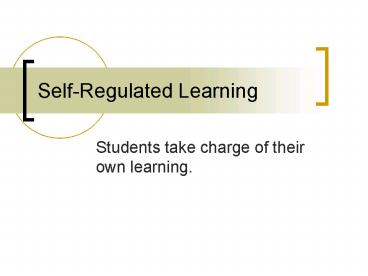Self-Regulated Learning PowerPoint PPT Presentation
1 / 20
Title: Self-Regulated Learning
1
Self-Regulated Learning
- Students take charge of their own learning.
2
Self-Regulated Learning
- Students are able to monitor, assess, and modify
their behavior based on their evaluation of what
they have successfully learned. - Students are able to be in charge of their
learning and studying environment. - (Winne, 1995)
3
Self-Regulated Learning
- Students can manage their time.
- Students can request support when needed.
- Students believe that they can be academically
successful (self-efficacy). - Students are able to set goals, plan, and use
study strategies. - Students are able manage their emotions, i.e.
test anxiety. - (Winne, 1995)
4
What does Self-Regulated Learning Look Like?
- Students know cognitive and study strategies.
- Students know when to use the strategies.
- Students can plan and manage their time.
- Students can focus on learning and goals.
- Students believe they can learn (self efficacy).
- Students have a positive attitude towards
learning. - Students can self-motivate to learn.
- (Ley Young, 1998 Schraw, Crippen,
Hartley, 2006 Winne, 1995)
5
Self-Regulated Learners Task Behaviors
- Analyze the task
- Interpret the task requirements.
- Set specific goals
- Select appropriate strategies.
- Implement strategies
- Monitor progress (internal feedback).
- Adjust the strategies.
- Use self-motivational strategies
- Keep on task.
- Combat discouragement.
- Deal with difficulties.
- (Vockell, 2001)
6
Self-Regulated Learning
- Can be taught and can be learned
- Self-assessment
- Monitor your own performance.
- Self-judgment
- Evaluate your own work.
- Self-Modification
- Set goals.
- Use self talk.
- Change the environment -eliminate distractions.
- Ask for help.
- (Vockell, 2001)
7
Self-Regulated Learning
- High achieving students
- Set more detailed learning goals.
- Use a multiplicity of strategies.
- Self-monitor more frequently.
- Systematically modify efforts, goals, and
strategies. - (Rubin Reis, 2006)
8
Self-Regulated Skills Cycle
(Zimmerman, 2002, 1998)
9
Phase 1Forethought
- When will I write the paper?
- Where will I write the paper?
- How will I get started writing?
- What will help me write the paper?
- (Zimmerman, 2002, 1998)
10
Phase 2Performance Control
- Am I accomplishing the work?
- Is this work taking more time than I thought?
- Can I encourage myself (use self-talk) to keep
going? - What will help me?
- (Zimmerman, 2002, 1998)
11
Phase 3Self-Reflection
- Did I do a good job writing that paper?
- How did I keep on task?
- What helped me?
- Did I give myself enough time?
- Did I choose the right study strategies?
- Did I set rewards and consequences for myself?
- Did I follow my plans?
- (Zimmerman, 2002, 1998)
12
Self-Regulation Strategies
- Organizing Information
- Outline.
- Summarize.
- Highlight.
- Use index cards to self test.
- Draw diagrams.
- Use concept maps.
- (Vockell, 2001 Winne, 1995 Zimmerman, 2002)
13
Self-Regulation Strategies
- Set Goals.
- Devise a plan to achieve the goals.
- Manage your time well.
- Keep records and self-monitor
- Take notes.
- Gather information.
- Organize information.
- (Vockell, 2001 Winne, 1995 Zimmerman,
2002)
14
Self-Regulation Strategies
- Rehearsing and memorizing
- Use mnemonic devices.
- Teach someone else the concepts.
- Make up and answer sample questions.
- Use mental imagery.
- Overlearn-Use repetition.
- Say notes aloud.
- (Vockell, 2001 Winne, 1995 Zimmerman, 2002)
15
Self-Regulation Strategies
- Behavioral
- Self assessment
- Break the task down into its parts.
- Set goals.
- Set up consequences for yourself
- Use positive reinforcement
- What will I do to reward myself for a job well
done? - Set consequences
- What will I do if I do not follow through?
- (Vockell, 2001 Winne, 1995 Zimmerman, 2002)
16
Self-Regulation Strategies
- Where will I gather Information?
- Library, Internet, textbook, notes.
- Where will I study?
- Eliminate distractions, comfortableness, plan
study periods and breaks. - Where and when will I request assistance?
- Help from peers professors.
- Tutoring.
17
Self-Regulation Strategies
- Structuring the environment
- Arrange the physical setting.
- Eliminate distractions.
- Break up study periods.
- Spread study periods over time.
- Seeking assistance
- Help from peers.
- Help from the professor.
- Tutoring.
18
References
- Jakubowski, T., Dembo, M. (April, 2002). Social
cognitive factors associated with the academic
self-regulation of undergraduate college students
in a learning and study strategies course. Paper
presented at the annual meeting of the American
Educational Research Association, New Orleans,
LA. - Ley, K., Young, D. (1998). Self-regulation
behaviors in underprepared (developmental) and
regular admission college students. Contemporary
Educational Psychology, 23, 42-64.
doi10.1006/ceps.1997.0956 - Ruban, L., Reis, S. M. (2006). Patterns of
self-regulatory strategy use among low-achieving
and high-achieving university students. Roeper
Review, 28, 148-156. doi10.1080/02783190609554354
19
References
- Schraw, G., Crippen, K. J., Hartley, K. (2006).
Promoting self-regulation in science education
Metacognition as part of a broader perspective on
learning. Research in Science Education, 36,
111-139. doi10.1007/s11165-005-3917-8 - Vockell, E. L. (2001). Self-regulation of
learning. In E. L. Vockell (Ed.), Educational
psychology A practical approach (Online ed.).
Retrieved from http//education.calumet.purdue.edu
/vockell/edPsybook/Edpsy7/edpsy7_self.htm - Winne, P. H. (1995). Inherent details in
self-regulated learning. Educational
Psychologist, 30(4), 173-187. doi10.1207/s1532698
5ep3004_2
20
References
- Zimmerman, B. J. (2002). Becoming a
self-regulated learner. Theory Into Practice,
41(2), 65-70. doi10.1207/s15430421tip4102_2 - Zimmerman, B. J. (1998). Developing
self-fulfilling cycles of academic regulation An
analysis of exemplary instructional models. In D.
H. Schunk B. J. Zimmerman (Eds.),
Self-regulated learning From teaching to
self-reflective practice (pp. 1-19). New York,
NY Guilford Press. - Zimmerman, B. J., Bonner, S., Kovach, R.
(1996). Developing self-regulated learners
Beyond achievement to self-efficacy. Washington,
DC American Psychological Association.

